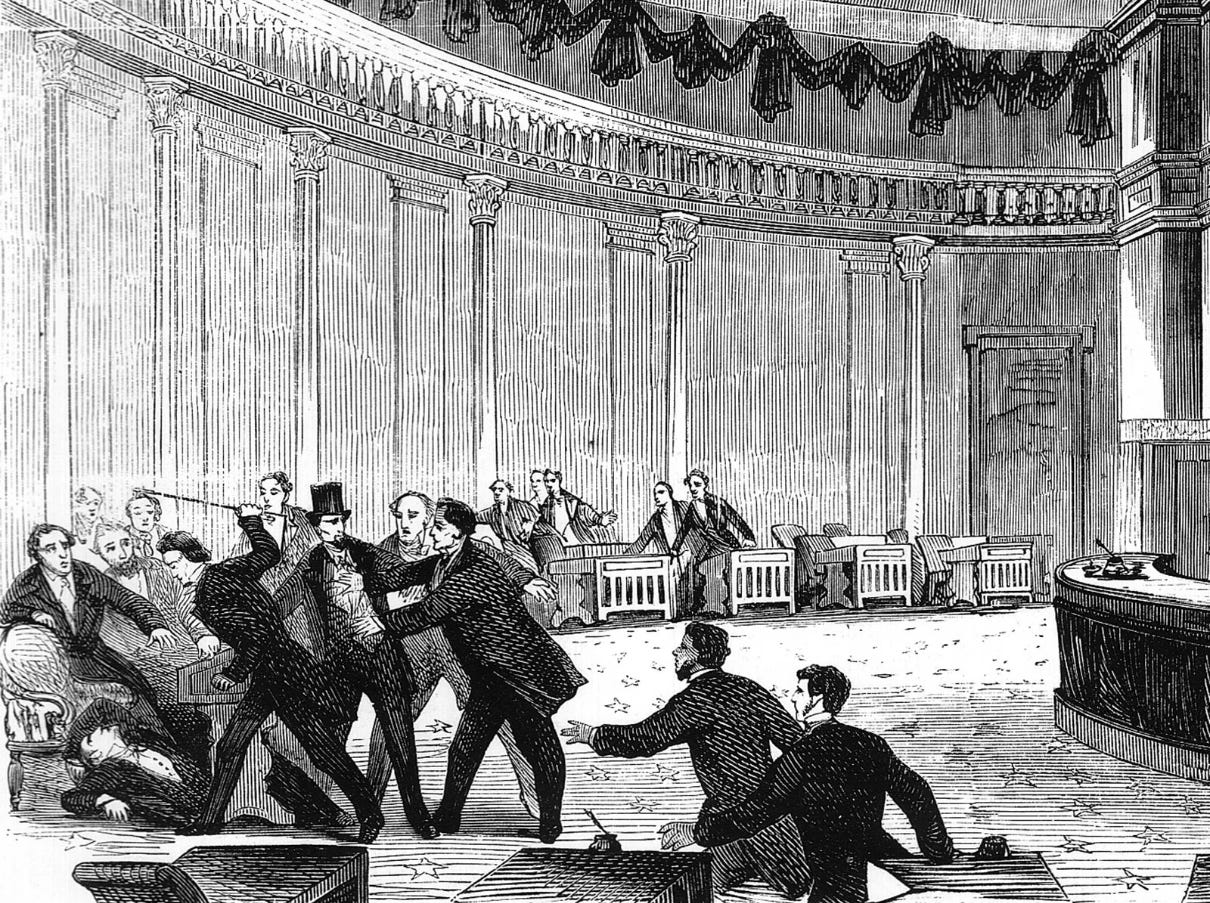Will Redistricting Become the Trigger for National Breakdown
The ‘Blue and Gray’ have become the ‘Red and Blue’ as both sides are on the brink of delegitimizing democratic institutions.

"If the Republicans are going to redistrict in the middle of the decade, then we have no choice but to do the same. Because to do otherwise would be unilateral disarmament."
That was the stark warning from Rep. Ritchie Torres this month as Texas Republicans prepared to push through a mid-decade redistricting map designed to cement partisan dominance for the next election cycle. California Governor Gavin Newsom echoed the militant tone, declaring that Democrats must "fight fire with fire" in response to what he called Trump's attempt to "rig the 2026 elections." The threat was clear: if you weaponize redistricting, we will retaliate by redrawing maps in every state we control at the first opportunity.
The language is unmistakably escalatory. It is also chillingly familiar. The United States has seen this kind of political brinkmanship before, during the nuclear stand-offs of the Cold War, when Mutually Assured Destruction (MAD) was the only deterrent to catastrophe, and in the years leading up to the Civil War, when an ill-fated piece of legislation called the Kansas-Nebraska Act of 1854 shattered a fragile national equilibrium.
The Kansas-Nebraska Act repealed the Missouri Compromise, which had set boundaries for the expansion of slavery and maintained a tenuous balance between free and slave states. By opening new territories to "popular sovereignty," Congress effectively told the nation that the question of slavery (a question many believed was settled) was now back on the table. Violence soon followed. In what became known as "Bleeding Kansas," armed bands attacked towns, burned homes, and murdered political opponents. The brutality extended to the halls of Congress itself, where in 1856 Representative Preston Brooks of South Carolina savagely beat Senator Charles Sumner of Massachusetts with a cane on the Senate floor after Sumner delivered an anti-slavery speech. The violence was not simply the product of local rivalries; it was a preview of the Civil War that would erupt five years later.

While the barbaric practice of slavery is not driving the current debate, nor is the underlying immorality comparable to the contemporary passionate rage tearing our system apart, we appear irreversibly close to the brink of destroying our political system.
In essence, today’s mid-decade redistricting fights threaten to destabilize American politics in ways similar to the run-up to the Civil War. For generations, states followed a basic rule: district lines would be drawn once every 10 years, following the census. This imperfect norm at least gave voters and parties confidence in the stability of the system. But if states now redraw maps midstream whenever a party gains power, the cycle of retaliation will be endless, and the legitimacy of the entire process will collapse.
The idea that a mid-decade redistricting is somehow a ‘pause’ or rare exception because of the existential nature of the moment is dangerously misguided. Laughable if not so irresponsible.
When one party weaponizes redistricting to entrench itself, the other party will almost certainly respond in kind. This creates a modern form of political nuclear escalation, with each side racing to outdo the other in rigging the process. But in this scenario, there is no real deterrent, only destruction. As both parties commit to manipulating their states’ maps for partisan advantage, they are effectively acknowledging that the system is irredeemably broken.
Let me say that again: There is no moral high ground when both sides rig the rules. Both parties, in effect, shut off the lights of American-style democracy. There is no defender of democracy when you undermine democracy to ‘save’ democracy.
And that, in itself, is the fatal blow. The country loses by that first act. Every politician or pundit who supports new maps designed to secure partisan dominance must understand that they are complicit in undermining faith in the system. Once voters believe elections are permanently rigged, they disengage, radicalize, or seek solutions outside of democratic politics.
The erosion of legitimacy becomes irreversible.
The parallels to Kansas-Nebraska are impossible to ignore. Then, as now, political leaders believed they could control the passions they were unleashing. Then, as now, each side justified its excesses as necessary retaliation. And then, as now, few stopped to consider what the country might look like once compromise was no longer possible.
Already, Americans are deeply divided, with public confidence in elections reflecting unprecedented partisan polarization. While overall confidence in election accuracy hovers around 57-63%, roughly consistent with levels since 2008, this masks a dramatic partisan split that has reached historic proportions. Republican confidence in election integrity has plummeted to just 28% in 2024, down from 55% in 2016, while Democratic confidence remains high at 84%. This 56-percentage-point partisan gap represents the widest divide Gallup has ever recorded on election confidence. If mid-decade redistricting accelerates, the result will be a political environment defined by tribal loyalty rather than democratic legitimacy.
What begins as a technical battle over district lines could end as a defining rupture, one that erodes the bonds holding the country together.
This is not about which party benefits. Both parties have engaged in gerrymandering and will continue to do so if allowed. But as in the 1850s, the danger lies not in the actions of one side alone but in the willingness of all sides to discard stabilizing norms for short-term advantage. Once those norms are shattered, they cannot easily be restored.
Americans must be clear-eyed about what is at stake. Mid-decade redistricting is not just another skirmish in the partisan wars; it is a test of whether we still believe in competitive, legitimate elections. If we fail that test, we risk entering a period of mutually assured destruction, one in which the political escalation we are witnessing becomes irreversible. Like the architects of Kansas-Nebraska, today’s leaders may soon find that the forces they have unleashed cannot be contained.




Imagine what could be achieved if all the energy spent on redistricting were instead directed toward figuring out what the [insert party name here] truly needs to do to improve the lives of the hundreds of millions of people it claims (often only in words) to serve. Then, when it is their turn at the helm, that party should prioritize solving real problems over goals like “balancing” the Supreme Court or changing Senate rules. If they focus first on "fixing the problem", then perhaps the next time voters enter the booth, they would have a genuine reason to vote FOR a party rather than simply against the incumbent.
What do you propose the Democrats do if Texas goes all in on this? Should they agree to lose the election because of red state redistricting? Where does that leave our democracy, or what’s left of it?
What are the alternatives?